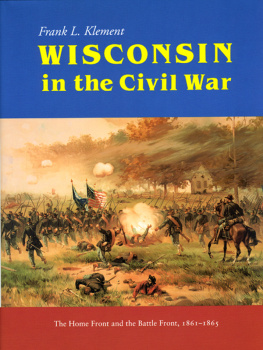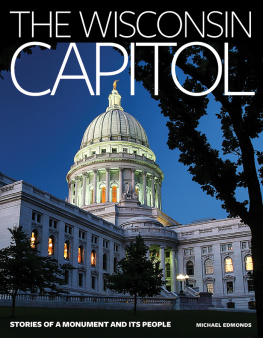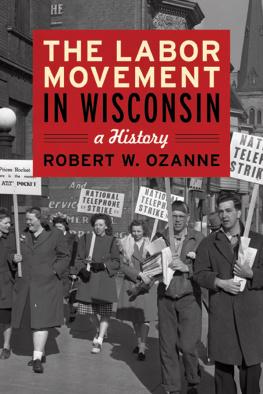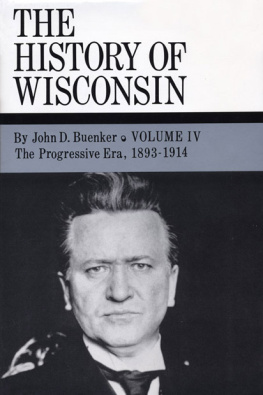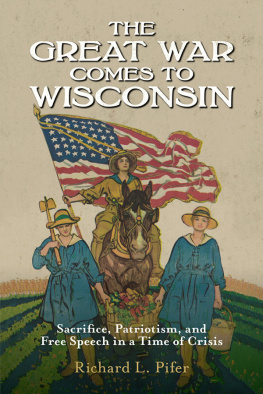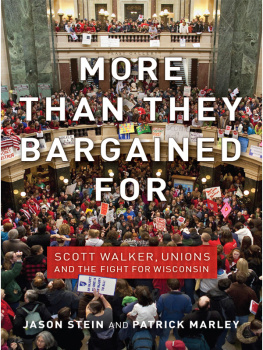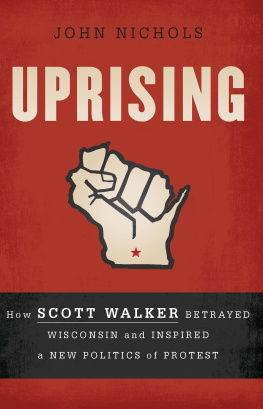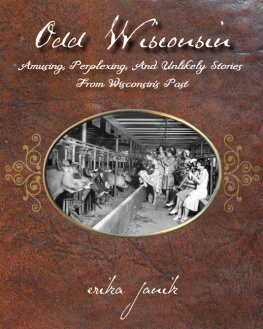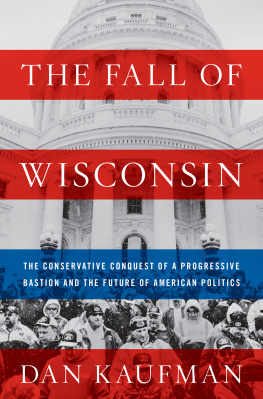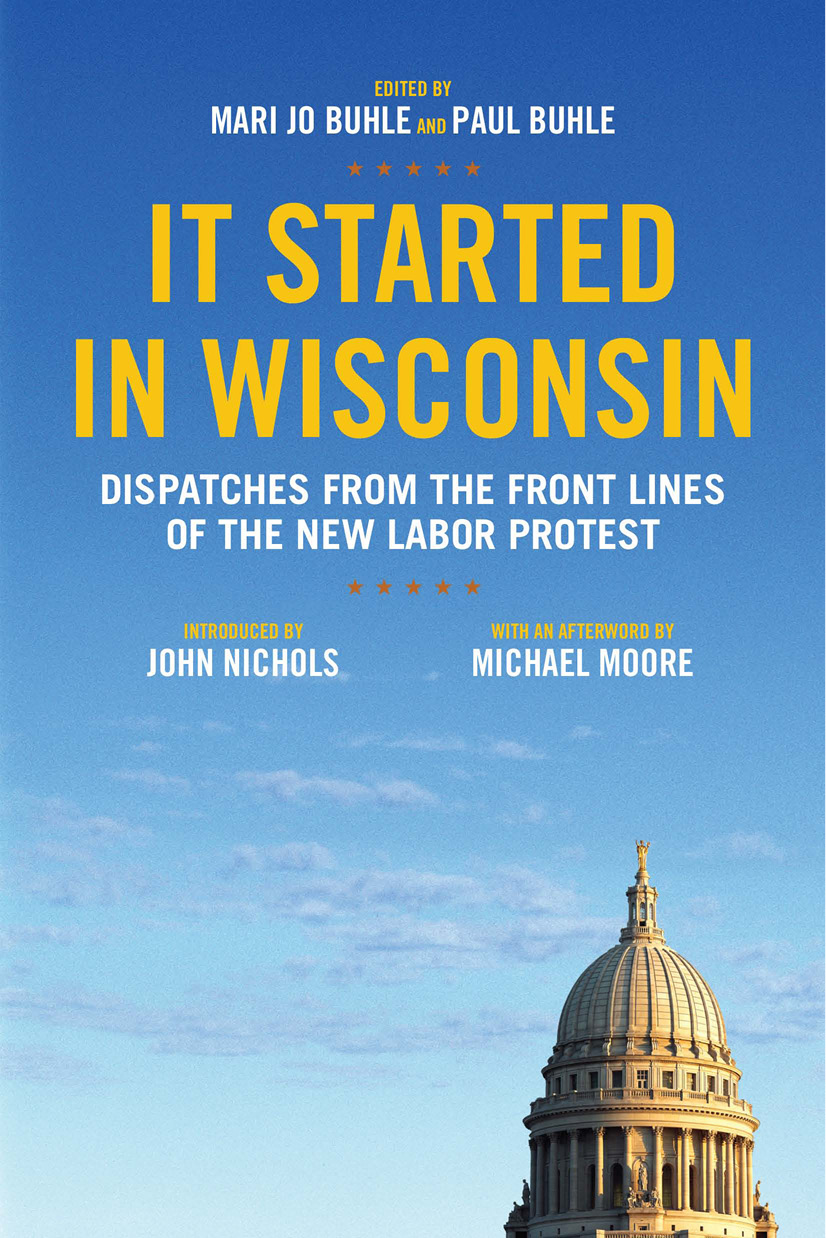
It Started in Wisconsin
Edited by Mari Jo Buhle and Paul Buhle
with an introduction by John Nichols
and an afterword by Michael Moore

London New York
First published by Verso 2011
The collection Verso 2011
Individual contributions The contributors
Mari Jo Buhles The Wisconsin Idea appeared in a different form in Academe , JulyAug. 2011, republished with the authors permission
Michael Moores How I Got to Madison appeared on his website, Mar. 16, 2011,
republished with the authors permission
Tom Morellos Frostbite and Freedom: The Battle of Madison appeared in Rolling Stone ,
Feb. 25, 2011, republished with the authors permission
Nick Thorkelsons Whats So Funny bout Beer Brats and Cheese and Unions? appears in another form in World War 3 Illustrated , Fall 2011, republished with the authors permission
All rights reserved
The moral rights of the authors have been asserted
1 3 5 7 9 10 8 6 4 2
Verso
UK: 6 Meard Street, London W1F 0EG
US: 20 Jay Street, Suite 1010, Brooklyn, NY 11201
www.versobooks.com
Verso is the imprint of New Left Books
eISBN: 978-1-84467-890-7
British Library Cataloguing in Publication Data
A catalogue record for this book is available from the British Library
Library of Congress Cataloging-in-Publication Data
A catalog record for this book is available from the Library of Congress
Typeset in Minion Pro by MJ Gavan, Cornwall
Printed in the US by Maple Vail
CONTENTS
John Nichols
Nick Thorkelson
Mari Jo Buhle
Tom Morello
Mary Bottari
Ruth Conniff
Nick Thorkelson and Paul Buhle
Patrick Barrett
Dave Poklinkowski
Charity A. Schmidt
Paul Buhle and Frank Emspak
Paul Buhle and Gary Dumm
Matthew Rothschild
Roger Bybee
Sharon Rudahl
Kim Scipes
Ashok Kumar and Simon Hardy
Michael Moore
Part 1 HOW IT STARTED IN WISCONSIN
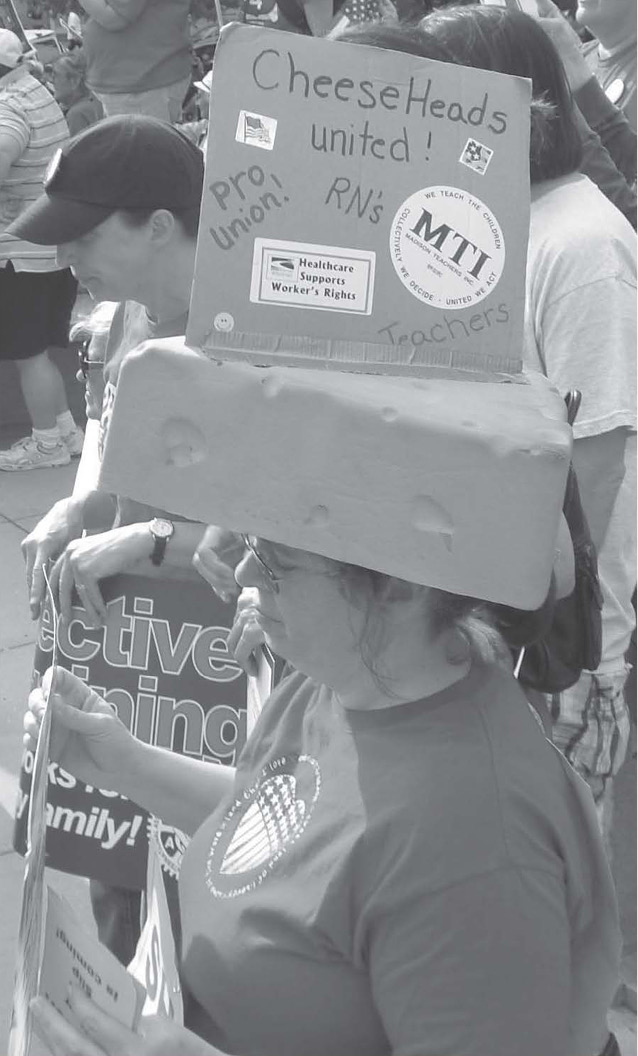
Mari Jo Bahle
INTRODUCTION: WHY WISCONSIN?
By John Nichols
On a bitterly cold Saturday morning in March 2011, I pulled on a heavy jacket and a good pair of gloves and headed south of my hometown of Madison, Wisconsin, to meet some farmers. Many had done their chores before dawn and then brought their tractors to the edge of our states capital.
The winds were blowing so hard that my daughter, Whitman, and I could barely hear my friend Joel Greeno, a dairy farmer from the far western part of the state, when he shouted: Lets roll. Greeno had put out the call to members of the Family Farm Defenders and Wisconsin Farmers Union to assemble that day. Fifty tractors fired up and began the three-mile ride into Madison. As we rounded the first corner onto one of the citys major thoroughfares, a small group of children held up signs reading: Thank you, farmers!
As our farm parade got closer to town, a larger crowd unfurled a banner that declared: Workers and Farmers Pull Together! The crowds grew larger and larger. Passing cars and buses honked their horns in the rhythmic cadence of a movement battle cry: This is what democracy looks like beep, beep, beep, beep, beep, beep, beep, beep, beep. Drivers rolled down their windows and shouted: Thank you! Thank you! When our tractorcade pulled up the hill and into the great square around the capitol, 150,000 Wisconsinites greeted the farmers with chants of An injury to one is an injury to all! and Solidarity!
Greeno and the other farmers had come to join the largest pro-labor mass mobilization in modern US history. After Wisconsin governor Scott Walker, a conservative Republican taking cues from corporate donors and right-wing think tanks, moved to eliminate most collective bargaining rights for state, county, and municipal employees and teachers as part of a broad plan to defund public services, Wisconsinites pushed back. The unions that were most threatened may have taken the lead. But they never stood alone.
When schoolteachers in Madison walked off the job to lobby against Walkers bill, they were followed by thousands of students who marched more than two miles to the capitol. When the teachers went back to work, parents stepped up to fill the void. The crowds at the capitol grew from thousands to tens of thousands to hundreds of thousands. Small towns across the state hosted their first-ever labor rallies. Then those who marched in the villages and towns of the state headed to Madison to join the rallies that grew larger and larger, and more and more diverse, as African American and Latino high school students from the urban core of Milwaukee rallied with eighty-year-old farmers from towns too small to find a place on the map.
The Reverend Jesse Jackson, astounded by what he was seeing, told a crowd gathered outside the capitol on a frigid Friday night, This is a King moment. This is a Gandhi moment. And he was right. The protests in Wisconsin captured national, even international, attention and caused union leaders in the United States, after being so battered for so long, to speak not just of a rebirth of the labor movement but of a renewal of the most fundamental of all radical precepts: solidarity.
But for all its international importance, what happened in Madison and the smaller communities of the state in the first months of 2011, and what continues now, is very much a Wisconsin moment. And this fine collection of essays seeks to put that moment in historical and contemporary, regional, and global perspective.
I know a bit about Wisconsin. My ancestors on my dads side came to Wisconsin in 1823 to mine lead near Mineral Point. My moms people arrived a decade later to farm in the Wyoming Valley. I was raised with an outsized regard for Wisconsin, by a mother who made sure we never passed a Wisconsin historical marker without stopping.
So when I say that I have never been prouder of my state than I was during those remarkable weeks in February and March 2011, when hundreds of thousands of Wisconsinites launched mass proworker and prodemocracy protests that would prove to be the largest and most sustained of their kind in the modern history of the United States, it is in this context. And that pride has only grown as public employees, teachers, students, private-sector workers, working farmers, small business owners, and their allies have maintained the momentumand the broad opposition to Governor Walkers proposals to remake Wisconsin as a more nasty and brutish place.
Nastiness and brutishness have been in ample evidence of late, not just in Wisconsin but across the United States. Walker may have been the first in a new crop of Republican governors to go for it and try to implement the whole of the corporate agendaas dictated by the billionaire Koch brothers and the array of front groups and putative think tanks they have funded. Even as Wisconsin was fighting back, word came of struggles in Ohio, Michigan, Maine, Florida, and other states. There is really no way to decouple the combat at the state level from the wrestling in Washington over proposals by the same right-wing forces to barter off Medicare to the insurance industry and social security to the speculators on Wall Street. It is, as the great Wisconsin governor and senator Robert M. La Follette said, the old fight.
The great issue before the American people today is the control of their own government, La Follette explained in 1912. In the midst of political struggle, it is not easy to see the historical relations of the present Progressive movement. But it represents a conflict as old as the history of manthe fight to maintain human liberty, the rights of all people.
Next page

